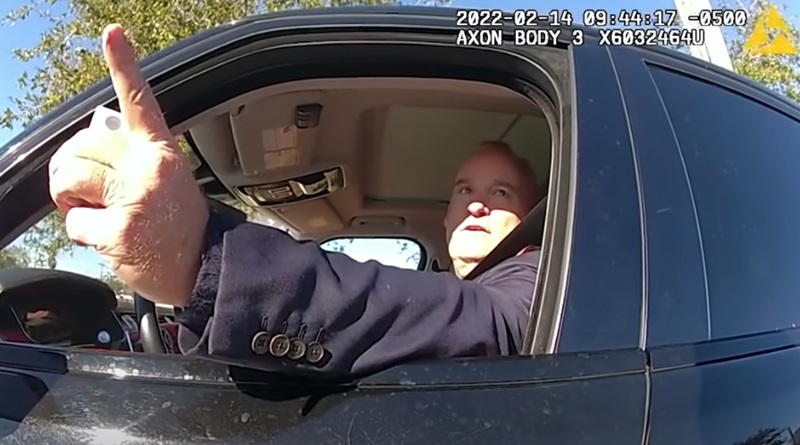
Patrolling a construction site, I saw a vehicle driving slowly among unfinished projects. Knowing that tools and lumber can be easy picking for thieves I made contact with the driver. He was immediately incensed and angrily explained that this was his construction site and couldn’t believe that he was being hassled on his own property. I verified his identification, which he reluctantly provided, and determined that he was, indeed, the owner of the project. Before I completed the contact I endured some moments of his berating me for bothering him. I apologized and, within his presence, notified dispatch that I had contacted the owner of the construction site and that he no longer wanted police protection of the property so we could take the location off of the patrol pattern. I could see that I’d made my point as he apologized, thanked me, and asked that we continue to patrol his property.
In February of 2022, a Sarasota Police Officer pulled over a vehicle for a speeding violation. The car was occupied by Martin Hyde who was at the time a candidate for Congress. Hyde immediately begins a painfully arrogant confrontation with the officer, including the infamous phrase “You know who I am, right?” as well as listing who he knew, including his plan to call the Chief, and telling the officer she was making a career decision with the clear implication that he intended to impede her career. He held out his phone to show he was recording her. He told a responding sergeant that “she’s going to pay the price for being disrespectful” and was sure to point out that he was driving a $150,000 car.
If there is a happy ending to this story it comes with an official apology with Hyde saying “I tried to bully her, I am not proud of it”, explaining that he was in a grumpy mood that day. He shut down his social media campaign accounts and lost his bid for Congress in the subsequent primary election.
In 2018, New Jersey Commissioner Caren Turner stopped at a traffic stop involving her daughter who was a passenger of the stopped vehicle, telling the officers on the scene that she was a concerned citizen and friend of the Mayor and demanding to know what was going on. The officers explained that all of the people involved were adults and they were the ones she should ask for information. “And I’m also an attorney. I will be speaking to the Mayor.” She continued to harass the officers with name-calling, including confronting the tow truck driver who was called to tow the vehicle in question. In another happy ending, Turner resigned after the investigation she requested brought media attention.
In April of this year, police attempted to stop a speeding driver, later identified as Sandra Doorly who, instead of pulling to the side of the road as required by law, continued to drive to her home and into her garage in Monroe County, New York. As soon as she stepped out of her parked SUV she told the approaching officer “I’m the D.A.” which she repeated with emphasis “I am THE D.A.” as she got on the phone with the Chief of Police. She later issued a brief statement about the incident, then a more explicit apology after the video of the traffic stop was publicized. The incident sparked multiple investigations and calls for her resignation.
Many states, like Colorado, have laws that prohibit attempting to influence a public servant “by threat, deceit, violence, or economic retaliation”, which should include the classic threat to have the officer’s badge and livelihood.
These notorious cases are minute samples of what happens every day to law enforcement officers carrying out their mandated duty. An officer’s integrity is at risk on every citizen contact. Persons who expect to be treated with privilege and preference are usually met with great patience by officers who know that body camera footage will show their professionalism in the face of belligerence and resistance. The integrity of supervisors and political leaders is also at risk when they fail to support the lawful actions of their officers.






